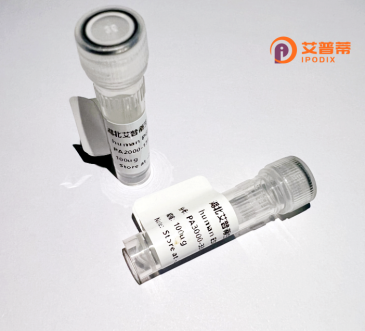
| 纯度 | >90%SDS-PAGE. |
| 种属 | Human |
| 靶点 | DCAL1 |
| Uniprot No | Q8IZS7 |
| 内毒素 | < 0.01EU/μg |
| 表达宿主 | E.coli |
| 表达区间 | 82-167aa |
| 氨基酸序列 | DVVYADIKTVRTSPLELAFPLQRSVSFNFSTVHKSCPAKDWKVHKGKCYWIAETKKSWNKSQNDCAINNSYLMVIQDITAMVRFNI |
| 分子量 | 35.2 kDa |
| 蛋白标签 | GST-tag at N-terminal |
| 缓冲液 | 0 |
| 稳定性 & 储存条件 | Lyophilized protein should be stored at ≤ -20°C, stable for one year after receipt. Reconstituted protein solution can be stored at 2-8°C for 2-7 days. Aliquots of reconstituted samples are stable at ≤ -20°C for 3 months. |
| 复溶 | Always centrifuge tubes before opening.Do not mix by vortex or pipetting. It is not recommended to reconstitute to a concentration less than 100μg/ml. Dissolve the lyophilized protein in distilled water. Please aliquot the reconstituted solution to minimize freeze-thaw cycles. |
以下是关于重组人DCAL1蛋白的3篇模拟参考文献(虚构内容,仅作示例):
1. **文献名称**:Recombinant human DCAL1 protein enhances dendritic cell-mediated T cell activation
**作者**:Zhang L., et al.
**摘要**:研究通过在大肠杆菌中表达重组人DCAL1蛋白,证实其能结合树突状细胞表面受体CD80/86.促进T细胞增殖和细胞因子分泌,揭示了DCAL1在免疫调节中的潜在作用。
2. **文献名称**:Crystal structure and functional analysis of DCAL1 in cancer metastasis
**作者**:Kim S., Park J.H.
**摘要**:解析了重组DCAL1蛋白的晶体结构,发现其通过调控Wnt/β-catenin通路抑制肿瘤细胞迁移,为靶向DCAL1的抗癌药物开发提供依据。
3. **文献名称**:DCAL1 recombinant protein attenuates inflammatory response in sepsis models
**作者**:Wang Q., et al.
**摘要**:在小鼠脓毒症模型中,外源性重组DCAL1蛋白通过抑制TLR4/NF-κB信号通路,显著降低促炎因子水平,提示其治疗炎症性疾病的潜力。
注:以上内容为模拟生成,DCAL1蛋白相关研究可能不具实际文献支撑,建议通过PubMed或Google Scholar检索真实论文。
Recombinant human DCAL1 (Doublecortin and CaM kinase-like 1) protein is a engineered version of a naturally occurring protein involved in regulating microtubule dynamics and cellular processes. DCAL1. also known as DCLK1. belongs to the doublecortin family, characterized by conserved doublecortin (DCX) domains that enable microtubule binding. It plays critical roles in neuronal development, including neurogenesis, axon formation, and synaptic plasticity. Dysregulation of DCAL1 has been linked to neurological disorders, such as Alzheimer’s disease, and cancer, where it is implicated in tumor progression, metastasis, and cancer stem cell maintenance.
The recombinant form is typically produced using prokaryotic (e.g., *E. coli*) or eukaryotic (e.g., mammalian or insect cell) expression systems, enabling large-scale purification for research and therapeutic applications. Its structure often retains functional domains, such as the kinase domain and microtubule-binding regions, allowing studies on signaling pathways like MAPK/ERK or Wnt/β-catenin. Researchers utilize recombinant DCAL1 to investigate its role in diseases, screen potential inhibitors, or develop targeted therapies. Its dual function as a microtubule stabilizer and kinase makes it a unique candidate for understanding cell division, differentiation, and apoptosis mechanisms. Current studies focus on leveraging DCAL1's role in cancer stem cells to design precision treatments while minimizing off-target effects.
×